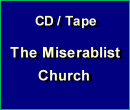Documents for your files
 |
PROGRESSIVIST DOCUMENT OF THE WEEK
Agatha Christie Appeals to Paul VI:
Do Not Change the Tridentine Mass
Do Not Change the Tridentine Mass
Before the promulgation of the Novus Ordo Mass by Paul VI, the world-famous English writter Agatha Christie wrote a letter to the Pope asking him to not change the perennial Mass. Although she was an Anglican, her arguments are valid and reflect the common concerns of any educated person.
A friend of TIA, who purchased this letter in an auction, allowed us to reproduce it. It is an extraordinary document that shows how wrong Progressivism is to adapt the Church to the modern world.
Below, we offer an easy-to-read English copy of the letter, followed by a photocopy of the original letter of the famous writer.

A friend of TIA, who purchased this letter in an auction, allowed us to reproduce it. It is an extraordinary document that shows how wrong Progressivism is to adapt the Church to the modern world.
Below, we offer an easy-to-read English copy of the letter, followed by a photocopy of the original letter of the famous writer.
Second Appeal to the Vatican
One of the axioms of contemporary publicity, religious as well as secular, is that modern man in general, and intellectuals in particular, have become intolerant of all forms of tradition and are anxious to suppress them and put something else in their place.
But, like many other affirmations of our publicity machines, this axiom is false. Today, as in times gone by, educated people are in the vanguard where recognition of the value of tradition is concerned, and are the first to raise the alarm when it is threatened.
If some senseless decree were to order the total or partial destruction of basilicas or cathedrals, then obviously it would be the educated – whatever their personal beliefs – who would rise up in horror to oppose such a possibility.
Now the fact is that basilicas and cathedrals were built so as to celebrate a rite which, until a few months ago, constituted a living tradition. We are referring to the Roman Catholic Mass. Yet according to the latest information available in Rome, there is a plan to obliterate that Mass by the end of the current year.
We are not at the moment considering the religious or spiritual experience of millions of individuals. The rite in question, in its magnificent Latin text, has also inspired a host of priceless achievements in the arts – not only mystical works but works by poets, philosophers, musicians, architects, painters, and sculptors in all countries and epochs. Thus it belongs to universal culture as well as to churchmen and formal Christians.
In the materialistic and technocratic civilization that is increasingly threatening the life of mind and spirit in its original creative expression – the word – it seems particularly inhuman to deprive man of word-forms in one of their most grandiose manifestations.
The signatories of this appeal, which is entirely ecumenical and non-political, have been drawn from every branch of modern culture in Europe and elsewhere. They wish to call to the attention of the Holy See the appalling responsibility it would incur in the history of the human spirit were it to refuse to allow the traditional Mass to survive, even though this survival took place side by side with other liturgical forms.
Agatha Christie
One of the axioms of contemporary publicity, religious as well as secular, is that modern man in general, and intellectuals in particular, have become intolerant of all forms of tradition and are anxious to suppress them and put something else in their place.
But, like many other affirmations of our publicity machines, this axiom is false. Today, as in times gone by, educated people are in the vanguard where recognition of the value of tradition is concerned, and are the first to raise the alarm when it is threatened.
If some senseless decree were to order the total or partial destruction of basilicas or cathedrals, then obviously it would be the educated – whatever their personal beliefs – who would rise up in horror to oppose such a possibility.
Now the fact is that basilicas and cathedrals were built so as to celebrate a rite which, until a few months ago, constituted a living tradition. We are referring to the Roman Catholic Mass. Yet according to the latest information available in Rome, there is a plan to obliterate that Mass by the end of the current year.
We are not at the moment considering the religious or spiritual experience of millions of individuals. The rite in question, in its magnificent Latin text, has also inspired a host of priceless achievements in the arts – not only mystical works but works by poets, philosophers, musicians, architects, painters, and sculptors in all countries and epochs. Thus it belongs to universal culture as well as to churchmen and formal Christians.
In the materialistic and technocratic civilization that is increasingly threatening the life of mind and spirit in its original creative expression – the word – it seems particularly inhuman to deprive man of word-forms in one of their most grandiose manifestations.
The signatories of this appeal, which is entirely ecumenical and non-political, have been drawn from every branch of modern culture in Europe and elsewhere. They wish to call to the attention of the Holy See the appalling responsibility it would incur in the history of the human spirit were it to refuse to allow the traditional Mass to survive, even though this survival took place side by side with other liturgical forms.
Agatha Christie

For a larger image click here









